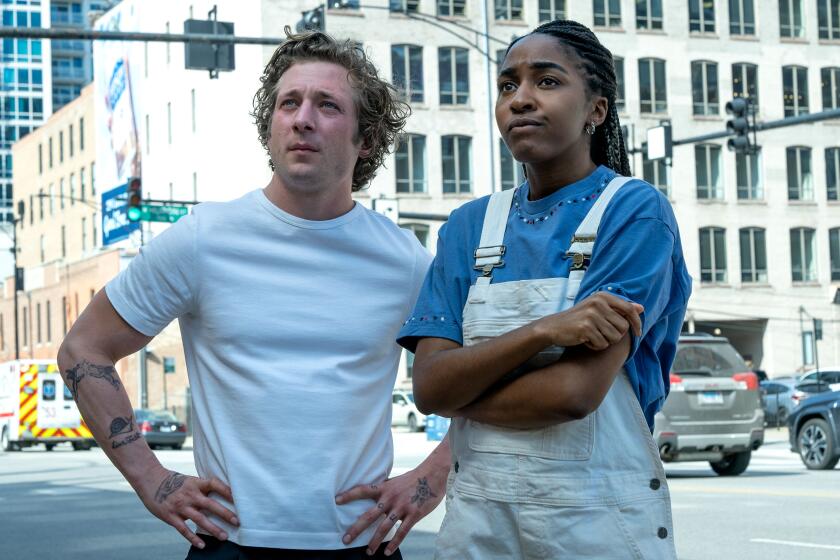AN APPRECIATION : Harry Reasoner: No Flash, Just Trustworthiness
If Harry Reasoner had been in the movies, he would have been the witty, all-knowing best friend of the leading man, the guy who keeps things in perspective. He didn’t have much sex appeal. All you did was believe him and trust him and like him.
The clothes didn’t matter much, nor the hair. The craggy Iowa face told you all you had to know. There was no flash, just that sly smile. And that is why when CBS newsman Reasoner, best known for his major role in “60 Minutes,” died Tuesday at the age of 68, many viewers surely felt a twinge, a personal loss of someone reliable whom they turned to for more than three decades on TV.
His wry style belied the tough, no-nonsense approach that was at the heart of his work. He just didn’t believe that you had to sound as though you were speaking from Mt. Olympus to be taken seriously. And the style worked--as an anchor at both CBS and ABC, as one of TV’s finest writers and, best of all, as a reporter for “60 Minutes,” where he could combine all his talents.
One of the highlights of his career is probably forgotten by many, but shouldn’t be--a series of program-length, prime-time, whimsical essays with subjects ranging from hotels to bridges to doors to women. The writer was a CBS newsman who was then relatively obscure, Andy Rooney. And Reasoner’s narration gave prime time that rarest of qualities--civility.
While Reasoner spent most of his career with CBS, he was, in fact, partly responsible for helping ABC get off the ground as a major news organization. Long the doormat of network TV, ABC finally began making important moves in the nightly news area in the late 1960s and 1970s. In fact, Peter Jennings, now the king of TV anchors, had a crack at the nightly starring role way back then--from 1965 to 1967.
But for the first half of the 1970s, ABC really began to make a move with the anchor team of Reasoner and Howard K. Smith. Reasoner’s goodby to ABC, however, began with the much-publicized hiring of Barbara Walters as his new co-anchor. They mixed like oil and water in one of television’s great miscastings.
Nonetheless, although Reasoner eventually returned to his alma mater, CBS, and to “60 Minutes” for which he had been one of the original correspondents with Mike Wallace in 1968, his tenure at ABC was significant in TV history. He helped legitimize the news department, which now dominates TV with such names as Jennings, Ted Koppel and, ironically, Walters.
Surely just as significant to TV history was the part Reasoner played in “60 Minutes,” the most successful prime-time news program ever and the granddaddy of all kinds of imitations. Now more than two decades old, the Sunday-night CBS fixture continues to be a stunning success, regularly finishing among the Top 10 shows in the weekly ratings.
Although critics both in and out of TV have rightly pointed out that “60 Minutes” is chock full of show-business gimmicks, it has also remained a bellwether of hard-nosed reporting, importantly illustrating that viewers will respond to such shows.
Even more remarkable, one of the probable trouble spots of the series--the aging of such star reporters as Reasoner, Wallace and Morley Safer--was also, tellingly, a strong point, as viewers remained loyal to tough, experienced reporters. Of course there is flash, but in the era of sensationalized “reality” series and empty-headed local news, “60 Minutes” almost seems conservative by comparison.
And while personalities are certainly part of the television mix, Safer perhaps was making a special point when, following Reasoner’s death, he said that his late colleague’s “most important contribution to journalism in this country was showing that it is possible to excel while not being an egotistical fool.”
Surely, he couldn’t be speaking of any network anchor.
There was a time during Walter Cronkite’s anchor reign at CBS when Reasoner was high on the list of his possible successors--long before Dan Rather and Roger Mudd battled for the job with some fierce in-fighting, with Rather triumphing, probably in great part because of his higher profile established on “60 Minutes.”
Reasoner ran into some formidable roadblocks as Cronkite’s possible successor. Cronkite was becoming America’s most trusted person, as a poll acknowledged, and he simply kept on going in the job.
There was a fine, wise quirkiness about Reasoner. It seemed entirely in character that in 1989, at age 66, he finally completed his credits at the University of Minnesota and got his bachelor’s degree in journalism. He once told me that visual material was not his highest priority on television--that the writing was virtually everything, “and I think I can help it a little on camera.”
In 1980, I spent part of a day with Reasoner at the Republican National Convention in Detroit, where I was covering the networks’ coverage for the late Herald Examiner. He was one of CBS’ floor reporters, along with Rather, Ed Bradley, Lesley Stahl, Morton Dean, Bob Schieffer, Phil Jones and Susan Spencer.
About 10:15 a.m., he was in the “ready room” in Joe Louis Arena, preparing for the opening Republican session. He had smoked several cigarettes, and his hand was shaking a bit.
“Must be the morning coffee,” he said. “But I guess I’m a little nervous about this assignment. It’s the first time I’ve done it since 1960.”
His convention lodgings were at the Somerset Inn in Troy, Mich., and he had already driven that day to Southfield for an 8 a.m. interview on the “Good Morning Detroit” show on CBS’ local affiliate station. He dutifully answered the question about his relationship with Walters at ABC.
And he told about the tough personal demands of working on “60 Minutes,” including an anecdote about one correspondent who rolled over in bed, touched his wife and asked about a wake-up call. “You’re home, stupid,” replied the wife.
Driving to the arena, Reasoner said: “I’m proud to be a floor reporter because that’s where a network puts its best reporters.”
Later in the day, at 7:40 p.m., Reasoner was in the ready room again, wired and made up and ready. He was confident now. He got up for the walk down the arena. His hand wasn’t shaking.
The complete guide to home viewing
Get Screen Gab for everything about the TV shows and streaming movies everyone’s talking about.
You may occasionally receive promotional content from the Los Angeles Times.



